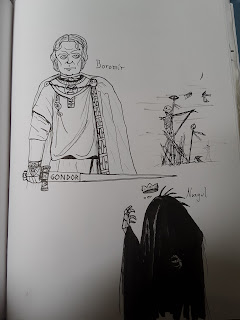The Mammoth Book of Fantasy (Cont.): The Platypus Reads Part XVII
Moving on from Vance and back into darker fare, we come to Darrell Schweitzer and Michael Moorcock.
King Yvorian's Wager by Darrell Schweitzer
When I read the first few pages of this, I swore I was back in Earthsea. Yvorian and his people seem strangely similar to fair-haired men of Karego-At and their god kings. It is also similar in concept and tone, though not ending, to Clark Ashton Smith's "The Last Hieroglyph." The form that the story takes, however, is that of a parable or a morality play. The message we've heard before: it's better to be poor and have love and meaningful work than to be rich, loveless and idle. Schweitzer is able to couch this moral in a story that, while still conventional, is able to capture the audience's attention and carry them through to the finish. Overall, there is nothing outstanding about the piece except in so far as it shows the author's ability to tell a compelling tale. So far in this collection, that's becoming a bit of a theme.
Kings in Darkness by Michael Moorcock and James Cawthorn
With Michael Moorcock we come to a subtle shift in the collection. To be precise, it's the point at which the verbal craftsmanship in the stories takes a sharp decline. Previously, all the authors in the collection have been preeminent wordsmiths, carefully selecting every word on the page to create a distinct tone or voice that draws us into another world. With Moorcock we run into an author that puts his creative eggs into another basket. Moorcock's writing seems a little phoney and slap-dash, but it's not where the power of his story comes from, that lies instead on a firm mastery of pacing. The speed at which the action occurs in "Three Kings in Darkness" is what keeps the reader reading, as well as the well-timed (and short) breaks in the action which provide just enough time to rally before something else exciting occurs. I suspect this emphasis on fast pacing owes more than a little to Robert E. Howard, but even Howard's admittedly pulpy prose seems much more planned than Moorcock's "git 'er done" style of writing. I also sense that unlike the earlier authors, Moorcock doesn't care about verisimilitude in creating his imagined world. The names, places, and the way that the characters speak all has a phoney, trumped-up, note about it as if someone is casually remembering their high school Shakespeare and trying to reproduce it on the page in slip-shod fashion. Still, as with author Terry Brooks, good strong pacing can amend for much and "Kings in Darkness" still turns out to be a page turner. It's a good reminder to aspiring authors that there isn't one sure path to literary victory.
Next Up: The Bells of Shoredan by Roger Zelazny and A Hero at the Gates by Tanith Lee
King Yvorian's Wager by Darrell Schweitzer
When I read the first few pages of this, I swore I was back in Earthsea. Yvorian and his people seem strangely similar to fair-haired men of Karego-At and their god kings. It is also similar in concept and tone, though not ending, to Clark Ashton Smith's "The Last Hieroglyph." The form that the story takes, however, is that of a parable or a morality play. The message we've heard before: it's better to be poor and have love and meaningful work than to be rich, loveless and idle. Schweitzer is able to couch this moral in a story that, while still conventional, is able to capture the audience's attention and carry them through to the finish. Overall, there is nothing outstanding about the piece except in so far as it shows the author's ability to tell a compelling tale. So far in this collection, that's becoming a bit of a theme.
Kings in Darkness by Michael Moorcock and James Cawthorn
With Michael Moorcock we come to a subtle shift in the collection. To be precise, it's the point at which the verbal craftsmanship in the stories takes a sharp decline. Previously, all the authors in the collection have been preeminent wordsmiths, carefully selecting every word on the page to create a distinct tone or voice that draws us into another world. With Moorcock we run into an author that puts his creative eggs into another basket. Moorcock's writing seems a little phoney and slap-dash, but it's not where the power of his story comes from, that lies instead on a firm mastery of pacing. The speed at which the action occurs in "Three Kings in Darkness" is what keeps the reader reading, as well as the well-timed (and short) breaks in the action which provide just enough time to rally before something else exciting occurs. I suspect this emphasis on fast pacing owes more than a little to Robert E. Howard, but even Howard's admittedly pulpy prose seems much more planned than Moorcock's "git 'er done" style of writing. I also sense that unlike the earlier authors, Moorcock doesn't care about verisimilitude in creating his imagined world. The names, places, and the way that the characters speak all has a phoney, trumped-up, note about it as if someone is casually remembering their high school Shakespeare and trying to reproduce it on the page in slip-shod fashion. Still, as with author Terry Brooks, good strong pacing can amend for much and "Kings in Darkness" still turns out to be a page turner. It's a good reminder to aspiring authors that there isn't one sure path to literary victory.
Next Up: The Bells of Shoredan by Roger Zelazny and A Hero at the Gates by Tanith Lee


Comments